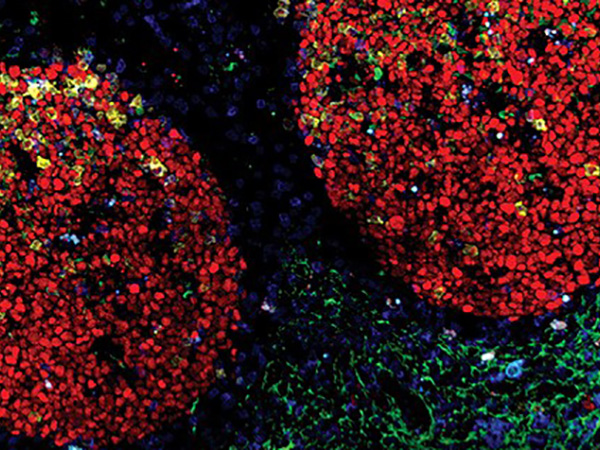NIH-AACR Cancer, Autoimmunity, and Immunology Conference: A Virtual, Multidisciplinary Forum on Immune-related Adverse Events
By Meghali Goswami

Meghali Goswami is a PhD candidate in the George Washington University – National Institutes of Health Graduate Partnerships Program and is currently on assignment with the AACR. She is performing her dissertation research in the Laboratory of Myeloid Malignancies at the National Heart, Lung, and Blood Institute on immunotherapeutic strategies to treat relapsed and refractory acute myeloid leukemia.
Immune checkpoint inhibitors have transformed the treatment of many cancers. These therapies, which harness a patient’s immune system to fight cancer, have allowed some patients with what were previously deemed terminal cancer diagnoses to achieve durable remission. Over 40 percent of patients diagnosed with cancer are eligible for treatment with an immune checkpoint inhibitor. This is remarkable given that these cancer immunotherapies are less than 10 years old.
As indications for immune checkpoint inhibitors have expanded, it has become clear that they are not without side effects. Immune checkpoint inhibitors are associated with immune-related adverse events (irAEs), or drug-induced, autoimmune- or autoinflammatory-like toxicities that are thought to occur because of non-specific activation of the immune system. The spectrum and severity of these immune toxicities are vast, and they are difficult for physicians to predict.
To facilitate multidisciplinary discussion around irAEs, the American Association for Cancer Research (AACR) has partnered with the National Cancer Institute (NCI), the National Institute of Arthritis and Musculoskeletal and Skin Diseases, the National Institute of Allergy and Infectious Diseases, and the National Institute of Diabetes and Digestive and Kidney Diseases to present an entirely virtual NIH-AACR Cancer, Autoimmunity, and Immunology Conference on March 23-24, 2020. In light of the developing situation regarding the novel coronavirus (COVID-19), AACR and National Institutes of Health leadership, together with the conference organizing committee, decided to convert the conference to a web-based activity.

“This conference is so important for our shared understanding and treatment of irAEs and translational immunology. We had the opportunity to engage researchers and clinicians in this unique, virtual format, and we jumped on it, because there really is an urgent need for this dialogue,” said Elad Sharon, MD, MPH, NCI senior investigator and conference cochair.

“As the field of cancer immunotherapy has progressed, questions regarding the biological underpinning of irAEs have arisen,” said Julie R. Brahmer, MD, codirector of the Upper Aerodigestive Cancer Program within the Bloomberg Kimmel Institute for Cancer Immunotherapy at the Johns Hopkins Kimmel Cancer Center and conference cochair. “We are still learning to predict and manage irAEs, and it’s critical that we take a team approach to address these potentially deleterious effects.”
Now in its third year, this year’s conference features sessions that delve into the use of immune checkpoint inhibitors for the treatment of infectious diseases; the interrelatedness of rheumatic and immune-related adverse events; and examples of and lessons learned from different multidisciplinary treatment approaches. Leonard Calabrese, DO, of the Cleveland Clinic, and Suzanne Topalian, MD, of the Sidney Kimmel Comprehensive Cancer Center at Johns Hopkins, will deliver keynote addresses that highlight current and future directions of the field.

“This conference will include the newest and most exciting research on irAEs. We welcome debate, encourage discussion of unpublished data, and look forward to identifying areas of scientific consensus, contention, and opportunity to advance our research efforts,” said conference cochair Howard Young, PhD, a senior investigator at the NCI.
Registration for the virtual conference is free and Continuing Medical Education (CME) credits and Maintenance of Certification (MOC) points will be available.
External photo courtesy of Andrea Radtke, PhD.



